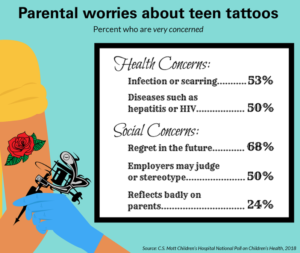What do I do if my teen wants a tattoo? How do I handle my teen wanting a tattoo?
 Years ago pediatricians considered tattoos a sign of risky behavior such as substance use or school truancy. Today that’s no longer the case. They have become more acceptable, with more than a third of people ages 18 to 29 having at least one tattoo according to a 2017 PEW Research study.
Years ago pediatricians considered tattoos a sign of risky behavior such as substance use or school truancy. Today that’s no longer the case. They have become more acceptable, with more than a third of people ages 18 to 29 having at least one tattoo according to a 2017 PEW Research study.
If your a parent that disagrees with tattoos, be prepared to have an educated and respectful conversation and with your teenager about your reasons (and feelings) and also take the time to understand their own feelings and reasons.
So how should you respond if your teen asks to get a tattoo?
Chances are your teen has been dropping hints for a while, so hopefully you have been preparing yourself.
Let’s talk and not attack.
First, no matter what your feelings are on tattoos, ask your teen their reasons for wanting one – calmly. Ask your teen a lot of questions. How long have they been thinking about a tattoo, and what does it mean to them? Is the image they’re considering something particularly meaningful — or just trendy, maybe because their peers are considering it? Why does it need to happen now?
In the United States, each state has its own law that governs whether teens under the age of 18 can get a tattoo. Many states allow tattoos for a minor without the presence or written consent of a parent. In several states, however, tattoos are prohibited for any person under the age of 18. With this, it’s important to have your fact in hand and be prepared to help your teenager understand all aspects of permanent tattoos.
Discuss the health risks.
 Of course teens believe they are invincible, however as a parent it’s our responsibility to talk about the health risks of tattoo ink. Some people have allergic reactions to the tattoo ink, causing itching, bumps, and rashes that might happen days, weeks, or longer after the tattoo was placed. Tattoos might make eczema, psoriasis, or other skin conditions flare up.
Of course teens believe they are invincible, however as a parent it’s our responsibility to talk about the health risks of tattoo ink. Some people have allergic reactions to the tattoo ink, causing itching, bumps, and rashes that might happen days, weeks, or longer after the tattoo was placed. Tattoos might make eczema, psoriasis, or other skin conditions flare up.
We know teens can be impulsive, caution them serious problems that can happen if you try to do a tattoo yourself, have a friend do it for you, or have it done in any unclean environment. Skin infections caused by bacteria, viruses, or fungi can happen if the skin is not cleaned properly, or the ink or needles are contaminated. Sharing needles, ink, or other equipment without sterilization increases your chance of getting HIV, hepatitis B, or hepatitis C.
What about social acceptance.
Teens don’t always think of the lifelong ramifications of their choices. Talk about the impact on professional prospects. According to one survey, half of the parents polled were very concerned that employers might judge or stereotype a teen with a tattoo.
Employers’ acceptance of tattoos has gone up over the past couple of decades. Fewer businesses now ban employee tattoos, but some still prohibit visible tattoos in the workplace.
Still, there’s always a chance that a tattoo could turn off a potential employer. The understandable teenage response is often “that’s not fair.” That may be the case, but we know this happens and it’s something they should be prepared for.
Is there a compromise?
What about a henna? Are henna’s safe? You might think that henna tattoos are a good substitute for traditional tattoos, as they are not permanent. Many parents assume that henna tattoos are a safe, fun way for a teen to experiment with having ink on their body. There’s no skin puncturing during henna tattooing, which means there’s no risk of blood-borne pathogens. However, there is a small risk of an allergic reaction and allergic contact dermatitis, which can be severe.
According to the American Academy of Pediatrics, red henna is generally considered safe. Adverse reactions are usually caused by hypersensitivity to the pigment.
In conclusion.
If you’re among parents who would say yes to a tattoo, research the tattoo parlor to ensure that it has been in business for a long time and that it employs a skilled artist in an established location. You may also ask to be part of the decision making of the permanent design they are considering and where they are placing it.
If you’ve decided not to allow your teen get a tattoo, discuss your concerns (as above) calmly/respectfully and the potential risks and ramifications which have lead you to your decision.
Hopefully when your teen understands your reasoning, they’re less likely to be tempted to find themselves in an unsafe, even illegal, situation.
Read: How to Build a Relationship Through Short Talks.
Read: How Bullying Impacts Mental Health.
###
If you’re struggling with a troubled teen and have reached your wit’s end, contact us to learn more about how residential therapy can help you and your family.







